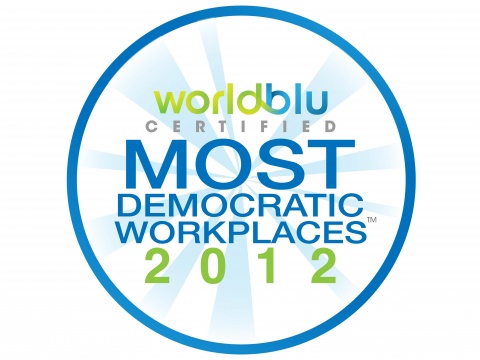
Great news for IkamvaYouth as we become the first South African (and African) organisation to make it onto the WorldBlu-accredited list of the “World’s most Democratic Organisations”.

IkamvaYouth is in the habit of performing minor miracles as most of the township high-school learners who join the programme need to jump at least at least 2 or 3 symbols to access quality post-school opportunities when they matriculate. However, it is not just what IkamvaYouth does, but also how IkamvaYouth does it that contributes to its sustained success. For the past 5 years, IkamvaYouth has achieved a matric pass-rate of between 85-100% and over 70% of IkamvaYouth learners have gained access to tertiary education. This is particularly impressive given the prevailing schooling challenges in South Africa and that IkamvaYouth does not have an initial academic entry requirement for learners.
A key feature of IkamvaYouth’s achievements is a commitment to inclusive value-based democratic decision-making which has resulted in IkamvaYouth’s inclusion in this year’s Worldblu List of the “World’s Most Democratic Workplaces”. There are 7 township-based IkamvaYouth branches in 3 provinces across South Africa and each branch is run by a democratically elected branch committee (branch-com) made up of committed volunteers and beneficiary representatives. The branch-com is responsible for implementing the IkamvaYouth model and everyone is invited to participate (including parents, partner organisations, learners, and community leaders) in all matters relating to the functioning of the branch. Great emphasis is placed on ensuring all deliberations are open and transparent and all aspects of the local branch are open for discussion including budget allocations and recommendations, hiring and firing of branch coordinators, performance reviews, budget decisions and ideas for improving the core programme offerings.
Joy Olivier, co-founder and director of IkamvaYouth, believes the democratic emphasis is a key reason IkamvaYouth achieves the results it does. According to Olivier, the democratic process leads directly to genuine collective ownership and community support. “This youth-centred decision-making model has effectively enabled the beneficiaries of the project to become its leaders and in the process, IkamvaYouth is building the leadership capacities of these young individuals through exposure to value-based democratic deliberations.” She adds, “It can only be good for this country’s democracy for young people to be actively involved in democratic structures and achieving the success IkamvaYouth achieves through this manner of engagement. It is therefore particularly gratifying to be included on the Worldblu List of the “World’s Most Democratic Workplaces” because democracy is not just something we do at IkamvaYouth, it is who we are.”
Alongside IkamvaYouth on the Worldblu List of the “World’s Most Democratic Workplaces” is the Fortune 500 company Davita and a number of other well-known democratically structured companies and organisations including Zappos.com, HCL Technologies, New Belgium Brewery, Great Harvest Bread Company and WD-40. Organisations from across the US, Canada, Mexico, the UK, the Netherlands, Denmark, Malaysia, Haiti, India, New Zealand and Singapore made this year’s WorldBlu List from a diverse range of industries including, technology, manufacturing, healthcare, retail, services and energy. The organisations range in size from five to 90,000 employees representing over $17 billion in combined annual revenue.
According to WorldBlu founder and CEO, Traci Fenton, this is the most global WorldBlu List to date which reflects an increasing movement towards democracy in how we organise ourselves and find ways to relate better to one another. “WorldBlu-certified organisations model how democracy unleashes human potential and builds highly successful organisations that change the world for the better.
Fenton continues, “We are especially delighted to have IkamvaYouth on the WorldBlu List this year as the first WorldBlu-certified organistion in South Africa and Africa. The youth represent the future of Africa and our world, which makes this especially inspiring. We hope African leaders will take note of IkamvaYouth impressive example and find ways to implement elements of its democratic model in organisations across the continent.”
Regional Coordinator, Andrew Barrett, adds that it goes deeper too, “We sometimes forget that democracy at both a broader political and narrower organsational level is not something that just happens on its own but requires careful cultivation and deliberate attention. To borrow an idea from Terry Tempest Williams, although we often see ‘democracy’ as something somehow ‘out-there’ and beyond us, the truth is that democracy ultimately begins in the human heart. If our democratic engagement is not rooted in the core human values of love, truth and justice then it becomes a very blunt instrument indeed.”
Democracy necessarily requires a high level of collaboration which itself requires an equally high level of caring and trust and because of this, IkamvaYouth dedicates a considerable amount of time and energy into creating a conducive environment for grassroots-directed democracy. This not only offers lessons in contemporary engagement in South Africa’s bigger social issues but also enables young people to engage with the rich heritage of this country’s past and craft their own response. Barrett concludes, “The overwhelming sense you get from everyone involved with IkamvaYouth – whether they are staff, volunteers, parents or learner beneficiaries – is a collective sense of pride in the organisation, and pride not just in what IkamvaYouth achieves but most notably in what IkamvaYouth is and represents.”
It must surely be true that the more young people there are actively involved in value-based democratic initiatives, the brighter the future of South Africa’s own democratic future and aspirations.
Marking the Occasion
To mark IkamvaYouth’s inclusion in the list of the “World’s Most Democratic Workplaces”, the IkamvaYouth branches in Gauteng are running a competition for learners and volunteers to submit a response to the question, “What does democracy mean to me?” Learners will be writing essays or employing other creative means at their branches on 10 April 2012 and will be presenting to the group on Saturday, 14 April 2012. Media enquiries or visits to any of our branches on either of these days is widely welcomed.
About the WorldBlu Accreditation Process:
Companies and organisations become eligible for a spot on the WorldBlu List of Most Democratic Workplaces™ only after its employees complete the WorldBlu Scorecard™, an assessment evaluating their organisation’s practice of the WorldBlu 10 Principles of Organizational Democracy™, with an overall combined score of 3.5/5 or higher. The WorldBlu Scorecard™ was developed based on a decade of research into what makes a world-class democratic company. Organisations from the for-profit and non-profit sectors that have been in operation for at least one full year and have five or more employees can apply for WorldBlu certification.
For more on the 10 Principles: http://worldblu.com/democratic-design/principles.php
View the full WorldBlu List of Most Democratic Workplaces™ 2012 and read more unique best practices from this year’s list at http://worldblu.com/awardee-profiles/2012.php.
About WorldBlu
WorldBlu has offices throughout the US and UK and specializes in organizational democracy and freedom-centered leadership, with organizational and individual members in over 70 countries worldwide. Founded in 1997, WorldBlu’s vision is to see one billion people working in free and democratic workplaces. For more information about WorldBlu, visit the website at http://www.worldblu.com.
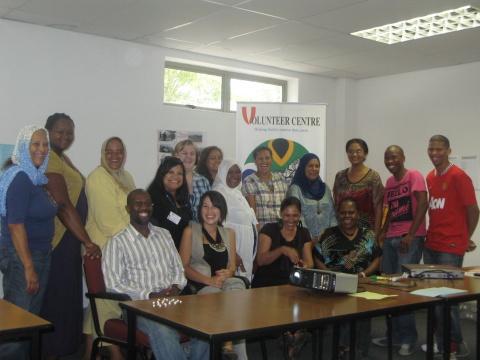
Makhaza and Nyanga branch assistants Zukile and Asanda attended an Effective Volunteer Management Training workshop which was held by Volunteer Centre at Claremont Library. This course is developed for managers/coordinators of volunteers to assist them in strengthening their management and support systems for their local and international volunteers. They also help organisations and their volunteers to understand their roles and responsibilities and expectations.
After these 3 days I realised that it is very important to treat volunteers well and make sure they happy. The value of the volunteers cannot be measured. Their contribution is critical to organisations operations and activities. One of the things I really enjoyed about the training is that our organisation IkamvaYouth is already doing all the things organisation should do to make sure that the volunteers are recognised. I learned the following things about tutor retention:
Training
Provide tutors with appropriate training, regular evaluation, and recognition. This means that all the tutors should get a training on how to be good tutor, what to do? And what is not needed to do.
Support and supervision
Regular opportunities for support and supervision are important and can help to identify, and even prevent demotivation which can result in volunteers leaving the organisation. This means that the branch assistance has to make sure that he/ she manages the volunteers, making sure that they get all the material they need to tutor. Also manage new tutors, by partnering them with old tutors. Also make sure that all the tutors have a group of learners to tutor. One of the things that cause tutors not to come back again is poor management. If they do not get the learners to tutor they get bored and do not come back again.
Recognition
Once tutors are working within our organisation it is essential to maintain their motivation and enthusiasm if they are to be retained. Care must be taken to treat volunteers in such a way that they will want to stay with the organisation. Developing activities that meet volunteers individual needs, provide recognition and appreciation of their work and celebrate a sense of achievement will promote self-esteem, strengthen commitment and develop a feeling of belonging and loyalty to the organisation. At IkamvaYouth we already are rewarding our tutors, such as end of year ceremonies with certificates, tutor outings and employment opportunities.
I learn a lot from the course and I’ll be bringing a lot of the lessons to our Makhaza branch, especial making sure that we retained our tutors and show how much we value them.

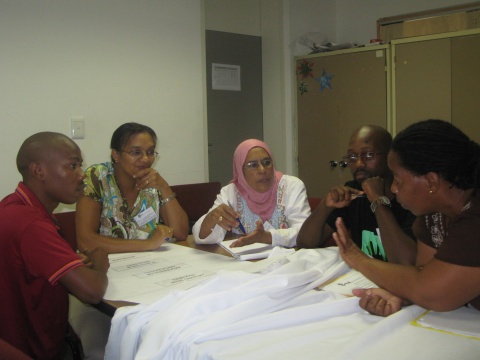

Ikamvanites had an amazing opportunity to be part of a Write4Life workshop at the end of March organised by FunDza Literacy Trust. The aim of the workshop is to support aspiring writers on their literary journey and provide them with useful skills to practice their craft. All the learners who participated acquired skills to translate their creative ideas into accessible and engaging pieces of work. They also had a chance to network with other keen writers and learn from the group experience. They got the opportunity to practice techniques to communicate effectively in the written form and receive good tips for writing for a critical audience.
By the end of the two day course , learners got the opportunity to produce a short story that was published on theFunDza network. Check them out here or on Mxit at (Tradepost > Mxit Reach > Mobi-Books > FunDza). The learners also received a certificate of participation.
Nomie one of the participant said “Never thought that writing would be so interesting. In Makhaza branch we were asked as learners to write a short paragraph if we are interested in writing workshop. I wrote the paragraph then I was amongst of the learners who were chosen to take part in Fundaza writing workshop. In the workshop I learned how to write poems, autobiography, short stories. In my life I never wrote anything before but now I can write lots of things. The facilitators were very helpful. Now I can’t wait to share the information with Ikamvanites and help them to be great writers like me”

An example of some of the things written is:
Can I, and other poems
Poet: Zintle Nyathi
School: Harry Gwala High School, Grade 11
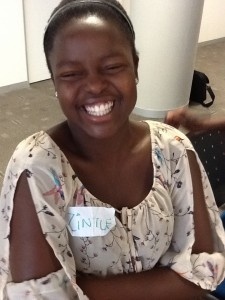
Can I?
Can I be who I am ?
Can I no longer follow instructions?
I want to be myself again.
Can I be intelligent, as I was?
I want to be who I was back then.
I’m tired of satisfying you.
Can I be myself again?
Can I ask you one question?
What does this mean to you?
I’m falling: you’re not helping.
I was walking, but now I’m crawling.
I’m inspiring, but you are not appreciating…
Why?
Where does this lead in future?
I’m tired of you.
Can I be who I was?
No satisfaction, but appreciation.
I’m tired of your games.
I want to be myself again.
My heart has been like a mirror
that has broken
When I pick up my pieces
I still see the cracks.
Can I be myself again?
***
If I never…
If I never grew
If I never knew
If I never do
If I never grew to see all the new experiences
If I never knew to listen to all the news
If I never did tell you that I do
If I never knew that living needs all respect due.
If I never grew to see these untold new stories
If I never did tell you that I do – where it was just doomed feeling.
If I never knew that life has all these new things.
I would never grow because I won’t do.
If I never grew I wouldn’t do because I never knew.
***
Impossible Mission
Why does it seem to be so cruel?
Why does it take time to reach the destination?
If we always say it’s impossible to achieve,
Day by day let them go by
Night by night watch the beauty of the stars
without observing the destination.
We let fear to our system of body
and let it bring fear to our imagination.
The most impossible mission – we all people surrender
Where this road is not taken
But you never gave it even a single try.
Why? Why?
Impossible mission. Impossible mission.
Let days pass by. Nights sleep not having a dream to take even one step.
Why impossible mission?
Mission is a destination to reach
But ups and downs are considered in this cruel world
you life or die but family is important.
For every story there’s success.
Behind success there’s a story.
Let impossible to possible be – strive for victory!
Big thank you to FunDza for this wonderful event, read some of the other works created here


This Tuesday, on 10 April 2012, IkamvaYouth will be announcing some exciting news that is a first for any organisation or company in South Africa. In fact, it is a first for any organsiation or company in the whole of Africa. We’re strictly forbidden from letting you know what it is until then but once the official announcement is made you can be sure that you will be the first to know. Log on to the IkamvaYouth website early on Tuesday morning for the full details.
Clue: It’s an award that is very closely linked to one of our CORE values, and relates not just to WHAT we do at IkamvaYouth but also HOW we do these things as IkamvaYouth.
Can you guess what it is about?

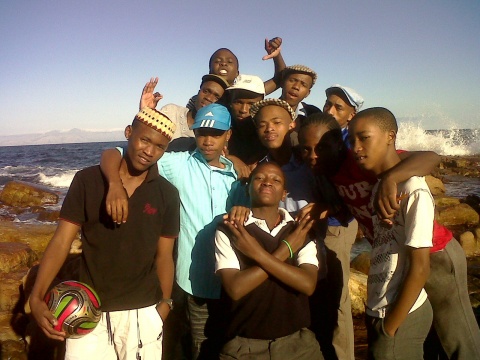
Initiated in July 2010 by the World Teach volunteers, the Masi Man Club’s has been created for answering youth concerns, promoting personal development, supporting collective actions within the Masiphumelele Community.
In 2011, the Masi Man Club’s members have been really active in supporting people who have been affected by the fire in May 2011. In fact, they volunteered their time to help carry building material and rebuild houses.
The format of each session answers 3 requirements:
– To be outside of the Library or outside the Community,
– To have a physical activity through sports or collective games,
– To provide time for a topic discussion.
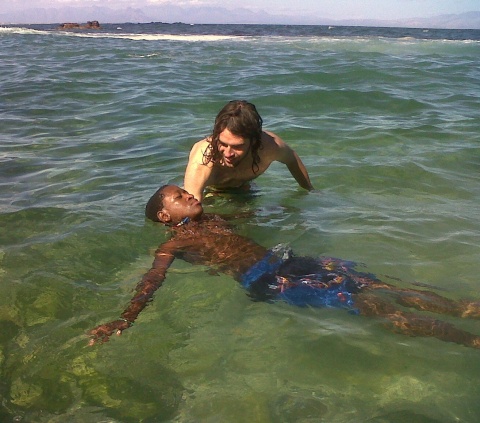
Nick Jones, history teacher and tutor at the Masiphumelele Branch, took over the Masi Man Club to propose a space where Ikamvanites can raise their concerns, express their opinions; propose solutions in a safe environment.
Members proposed the following topics to be discussed and developed along the year:
– What does that mean to be a Man for me today?
– What are the different kinds of relationships? And how a young man will deal with them?
– Peer pressure and peer support?
– Drug abuse and risks behaviours
– Protected sex.
– Dealing with my emotion.
– Get more information on fire safety, and get skills to answer this issue in the community.
– Career choices
– Hiking
– Repartition of tasks within the members
– Fundraising for the Masi Man Club activities and outings.
To be continued… 🙂
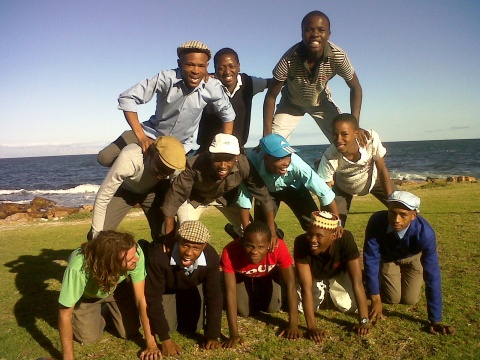

This past weekend of the 3rd and 4th March our Makhaza held their 2012 Strategic Planning Weekend. It was an excellent opportunity for volunteers, tutors and leaner reps to participate in core operational planning and goal setting.
The Main goal of our SPW was to elect a branch committee (in charge of roles and portfolios) and for new volunteers (grade12 from last year returning) to take ownership of programme and become part of the management team. It was also a great weekend for the leaner reps and tutors to get to know each other better.
Being a branch committee member isn’t easy, with the prestige comes a huge amount responsibility and high expectations from the rest of the learners and tutors to raise the branch up for the year and provide quality programmes.
We decided to shake things up a little this weekend and work together to provide all the branches with a working document that is the branch com constitution, outlining why it exists, the main aims and goals as well as cementing responsibilities of the various programmes.
Unathi Smile, a volunteer and intern at Makhaza says, ‘the weekend was a great experience for many of us, but speaking for myself it was a brilliant way of putting things in perspective. Saturday afternoon, what I took with me is that, 26 heads are so much better than 1 head, meaning if one person had to sit and think about burning issues at IkamvaYouth Makhaza branch, that would not have been a great experience and I assure that somebody would have taken time in thinking about these and finding solutions at the same time. Sunday morning was just too good to be true, learner reps appointed members of the branch comm. and I am proud to say that I was appointed for two portfolios, namely, Career Guidance and Computer (Khan Academy).
We had to present goals, what needs to be done to reach that particular goal, by when the goals should be reached and by whom. I have no experience of leading a team but it is great to learn and persevere at the same time meeting the needs of the learners and those of the Makhaza IkamavaYouth branch. I have taken away with me memories and have learned that one must not under estimate the ability of others.’
Zesipho Dyonase, Grade 9, says that “I have learnt that you don’t have to hold back any ideas or views that you have, you must voice them out. I have taken away with me the spirit of working together as a team, through that spirit, nothing can bring IkamvaYouth down.”
And our youngest branch comm member, confident and outspoken Grade 8 learner Luxhase Yokwana, head of tutoring says “I had so much fun, and definitely took away a lot of things, one of them being able to work with other learners from different grades. My parents were so proud of me when I told them that I am in the IkamvaYouth Makhaza branch committee, what is left of the Ikamvanites now is to put the plans into action.”
Read the full report here and have a look at our new Branch Comm Constitution
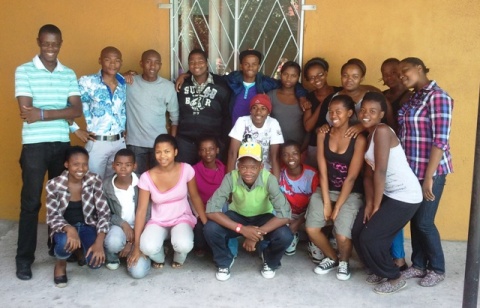
Our new Branch Committee 2012!
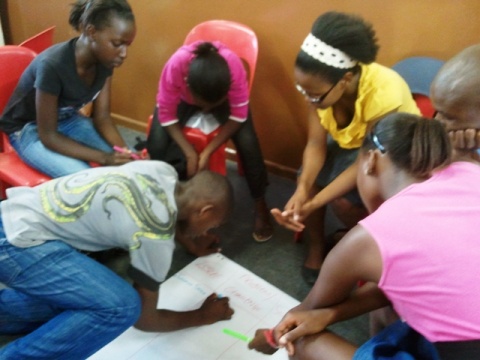
Plans become action lists
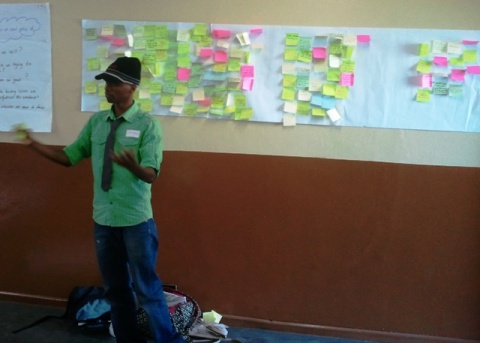
Puthang running through why we exist and the issues faced at the branch
















 Lloyd Lungu
Lloyd Lungu